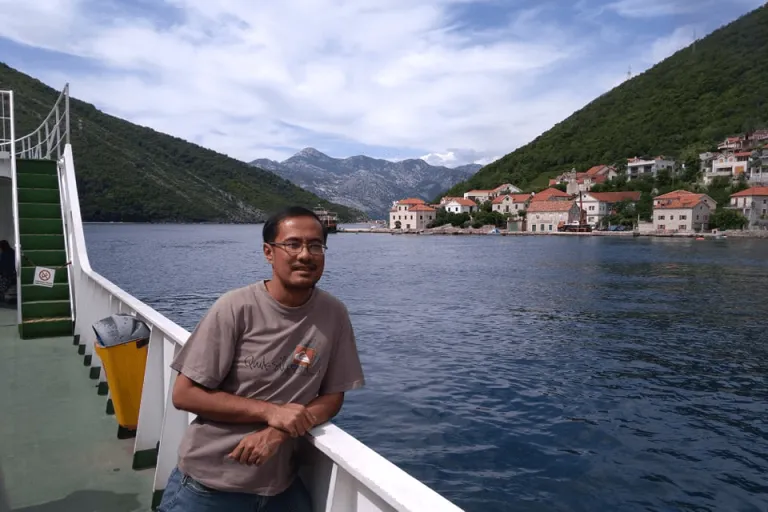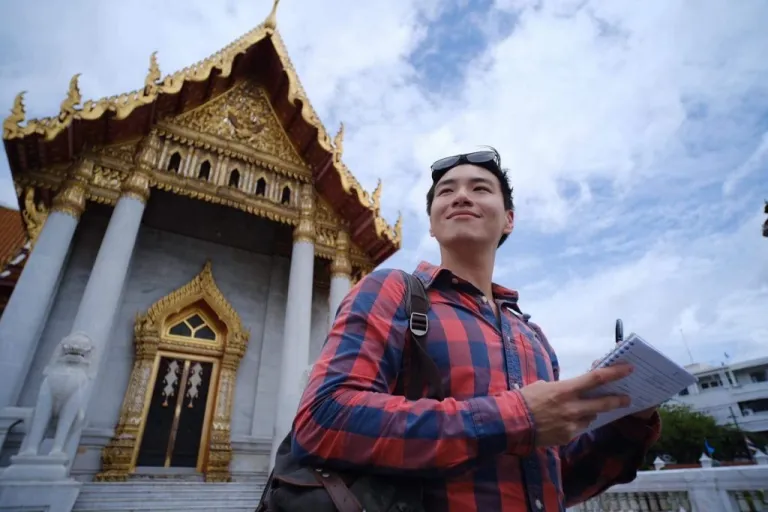Our favourite places to stay on this sleepy Cebu island.
How Learning Languages Changed Everything for These Filipino Polyglots

Filipinos continue to embrace language learning in 2025, not just as a travel hack but as a way to connect with people, build careers, and take care of mental health. From Vietnamese phrases learned on the streets of Hanoi to French used in embassies and medical settings, these inspiring polyglots prove that speaking more than one language can change your life in unexpected ways.
When I was 24, I decided to live in Vietnam, where English, let alone Tagalog or Bicolano (my first language), were hardly spoken. In five months, I survived with the help of English-speaking locals. Knowing it wasn’t enough, I had them teach me basic words and phrases along the way. That way, in their absence, I could learn to live like them. And I did.
Fast forward four years, and I still find myself randomly uttering “Anh/Em ơi!”, the Vietnamese way of calling someone’s attention (kind of like “Hey” in English or “Hoy” in Tagalog). I can also still count to three in the language, as in “Một, hai, ba ”, mostly because I’d often spend so much time in Hanoi’s beer street where one would hear these words during toasts (just add “vô!” at the end). But not having continued learning the language when I came home, that’s as far as my grasp of Vietnamese goes.
Also read: Language Learning Tips by Filipino Polyglots and Linguaphiles
The benefits of learning languages according to Filipino polyglots
Needless to say that if I could speak to my 24-year-old self, I’d fiercely convince him to take language learning more seriously. The benefits of learning languages are, after all, vast, but something I didn’t fully understand at the time. Below, four Filipino polyglots discuss just what these fascinating benefits of learning languages are as personally experienced by them.
It makes travelling easier and more fulfilling
“Travel to the place where the language is spoken,” urged Kao-wen Chang, a Taiwan-born Filipino, when I asked him what he considers the best way to learn a language. Growing up in a multicultural family, he speaks Tagalog, English, and Mandarin. He can also converse fluently in European Portuguese, French, German, Japanese, and Spanish.
 Image credit: Kao-wen Chang
Image credit: Kao-wen Chang
After he shared that tip, he recounted how learning these languages helped him make the most of his travels abroad, particularly in Europe. “I backpacked for two weeks in Portugal. Whenever the locals noticed that I speak Portuguese with a Portuguese accent, they would be very happy to know that I am a language learner and carry a conversation with me,” Kao-wen shared.
A trip to France then showed him that locals would sometimes treat him better when he would talk to them on a conversational level. “This is true among Parisians who have a reputation for being rude to tourists,” he said. “I can safely say that if you start your conversation with ‘Bonjour’ or ‘Salut’, followed by asking a question in French, they warm up to you.”
In specific cases, the 28-year-old traveller said that locals would even give him gifts upon learning of his multilingualism. “I do not want to paint myself as a cheapskate, but I was able to get free coffee, free snacks, or discounts from locals because I did my best to speak to them in their language,” he shared.
 Image credit: Kao-wen Chang
Image credit: Kao-wen Chang
Naturally, his proficiency in French also helped him explore the country more efficiently. “When I was in France, I was able to navigate my way through the metro much faster than expected. There may have been hurdles along the way because I do not have a good sense of direction, but knowing French allowed me to ask people or read signs leading me to my destination,” he proudly told TripZilla.
It allows you to connect with different people, regardless of where you are
Learning languages also allows one to connect with all sorts of people, regardless of whether you’re travelling or not. Daniel Carreon, who started studying Spanish in 2004, followed by French in 2007, said that to him, language learning is “a treasure that follows its owner everywhere.”
 Image credit: Daniel Carreon
Image credit: Daniel Carreon
A physician by training, Daniel managed to use Spanish when speaking to Spanish-speaking tourists in Prague, Czech Republic. “I joined a city tour in Prague, where there was this elderly Argentinian couple who couldn’t speak fluent English. Together, we talked about Fidel Castro and politics in South America,” he said.
Learning on his own, Daniel also shared that knowing other languages would allow him to hear mass abroad where only the mother tongue is spoken. This was especially useful when he attended a church service that was in Spanish. Likewise, it has helped him get to know and bond with people of other nationalities on a deeper level, without having to leave the country.
 Image credit: Daniel Carreon
Image credit: Daniel Carreon
While working locally, Daniel was able to use his French proficiency when he treated patients from West Africa. “I had a couple of West African patients who came over for medical consultation at the hospital where I work. It was a delight when we discovered we all speak the same language,” Daniel fondly recalled. “They gave me a chance to practise my medical French during an actual consultation. I even got a surprise call from their dad in Africa who thanked me for taking care of his children! That experience was priceless.”
It gives you an edge in career and academic opportunities
“I’d say that my language skills have helped me professionally and personally,” further shared 30-year-old Jessie Jhon Mateo-Magkilat, or Juan Mateo for short. “I have organised several projects in the Balkan region. Knowing how to read Cyrillic helped me with financial reports where I handled tickets and receipts.” Born in Lanao Del Sur, Juan works as a project manager for private and academic organisations in Europe.
 Image credit: Juan Mateo
Image credit: Juan Mateo
Now based in Germany, Juan speaks and understands 11 languages. They include Ilocano and Waray for local, and German and Portuguese for international. Before his overseas work, he would have a leg up in local job opportunities after studying French in university.
“My French teacher offered me to study in France with a scholarship from the French Embassy in Manila. So I went to France for almost five months after my BA degree,” he said. The experience then pushed him to eventually try more opportunities that would let him use his language skills.
“I applied for a position in the same embassy. Later, I was called for the interview because among the applicants, I was one of those who can speak French. Although, it was not part of the job qualifications,” Juan added. “I entered the room saying ‘Bonjour!’ to the five panellists, and I ended up having the entire interview in French. It was memorable because, despite my limited proficiency, I was able to sustain the conversation for more than 50% of the time.”
 Image credit: Juan Mateo
Image credit: Juan Mateo
Juan also used to teach French via private classes and in three universities in Mindanao. “It was a good job because I had almost no competitor,” Juan told TripZilla. Finally, he moved to Germany, where he fluently speaks the language after learning it from when he was just nine years old.
It’s all-around enriching and a form of self-care, too
For anthropology graduate student and language instructor Mark Ong, his language interest alone opened doors for a cultural exchange project during his undergraduate years. After befriending Japanese exchange students at his university, he went on to join an exchange programme in Japan where he learned Japanese more intensively.
 Image credit: Mark Ong
Image credit: Mark Ong
“When I returned home to the Philippines, I reunited with my two Japanese friends and surprised them by speaking conversational Japanese,” he shared. “One of them started crying because she was ‘so touched’ after we had a full conversation in Japanese. That was perhaps the turning point of my language learning journey.”
Just like with travelling, reading, or even working out, Mark has found a form of personal satisfaction from studying languages. Even without interacting with other people, he told me that it broadened his perspective of the world.
“[Learning languages] has given me more ways to express myself and understand others,” shared Mark, who also studied in a trilingual Chinese-Filipino school where he was exposed to the benefits of learning languages at a young age. “Through it, I soon realised that you can only know and learn so much with just one language. Learning another helps you gain a better view and interpretation of various human and cultural concepts and phenomena.” Currently, he speaks eight languages: Brazilian Portuguese, English, Hokkien, Japanese, Korean, Mandarin, Spanish, and Tagalog.
Mark continued by pointing out that there are concepts that do not have equivalent terms in other cultures. By learning languages, we can more accurately make sense of them. “I mean, honestly, how do we explain the concept of kilig and tampo to a non-Filipino? They definitely can experience it as a human being. But can they easily put those into words (or rather, word)?” he said.
 Image credit: Migs Santillan
Image credit: Migs Santillan
More than that, learning languages has given Mark emotional support when no one couldn’t. “[When I was younger], I was constantly bullied and also suffered from bouts of depression and anxiety. After school, I would usually go to the local bookstore and read phrasebooks and language textbooks to satisfy my curiosity and help me cope,” he told TripZilla.
From time to time, when Mark experiences the same emotions, he turns to textbooks and foreign reading materials for comfort. “I not only get the chance to calm down, but I also get to keep my brain healthily active as well,” said Mark, who believes that the human aspect of learning languages is still the most important of all.
Also read: 13 Easy Tips To Conquer The Language Barrier Abroad
If these stories haven’t made it clear, learning languages open plenty, even countless life-changing opportunities for Filipinos. As we delve deeper into each one of them, the more we discover that these benefits go beyond what we hear, read, or speak every day. Just as one of these Filipino polyglots further stressed, language learning is not just cool, it’s also fun and comparable to an open book — it will keep on giving no matter what.
These stories are part of our ongoing series on Filipino polyglots and their journeys. Stay tuned for more inspiring language learning stories.
The quotes above have been edited for grammar, clarity, and flow. Featured image credit: Mark Ong
Published at
About Author
Joser Ferreras
Subscribe our Newsletter
Get our weekly tips and travel news!
Recommended Articles
10 Bantayan Island Resorts, Hotels, and Rentals for Your Tropical Escape 10 Best Mountain Cafes in the Philippines for Your Peak Coffee Experience Coffee date on the mountains, anyone?
10 Best Things to Do in Los Angeles Los Angeles is more than Hollywood stars. From hikes with killer views to beaches straight out of a rom-com, here are 10 must-do LA experiences for Filipino travellers or any wanderers in general!
10 Commandments for Responsible Travel Flexing Spread the good word!
10 Cutest Cafes in Japan That Are Totally One of a Kind From Pikachu snacks to Totoro cream puffs, here are 10 themed cafes in Japan that prove café hopping should be part of your travel itinerary.
Latest Articles
How Filipino Travellers Can Save on Noche Buena and Spend More on Travel Holiday savings for travel
Thailand Eyes to Build Disneyland Instead of Casino Complex Thailand is considering bringing Disneyland to the country, replacing a previously proposed casino and entertainment complex.
US May Require Five Years of Social Media History for Tourists Are Filipino tourists affected?
3 Days in Okinawa: Everything We Saw, Did, and Ate in Japan's Southern Gem Here's your ultimate travel guide to Okinawa, Japan!
Cheap Domestic Flights Needed as Philippines Ranks Last in Southeast Asia Tourism Tulfo says local flights are too expensive and Filipinos deserve better travel deals.

